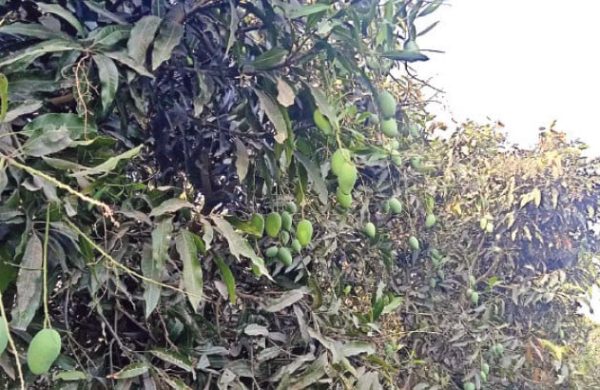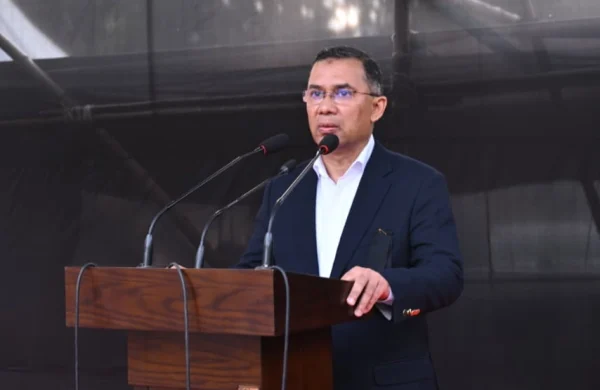Proper care essential to prevent premature mango dropping: Experts
- Update Time : Friday, April 4, 2025

Staff Correspondent:
Proper orchard management, including timely pest and disease control, balanced fertilization, and adequate water supply, is crucial to preventing premature mango dropping in the region, experts said.
Dr Alim Uddin, former Chief Scientific Officer of the Regional Fruit Research Station, emphasized the importance of sustainable orchard management to prevent premature fruit drop, which causes significant losses for farmers and traders.
He stressed the need for collaboration between agricultural extension officials, researchers, and farmers, along with the adoption of modern technologies to address the issue effectively.
Dr Alim noted that mango trees shed flowers and fruits due to multiple factors, including sudden changes in temperature or humidity, poor nutrition management, hormonal imbalances, and improper soil moisture. Additionally, fungal infections and insect or pest attacks contribute to premature fruit drop.
“Mango trees thrive in subtropical and tropical climates, but an established tree can withstand temperatures as low as 25 degrees Fahrenheit for a few hours. However, inadequate water supply can trigger early fruit shedding,” he added.
Dr Alim also highlighted the role of nitrogen-based fertilizers in mango cultivation, cautioning that excessive fertilization can harm younger trees. Fungal diseases such as powdery mildew and anthracnose are also responsible for premature fruit drop.
“The best defense against these diseases is to avoid excessive watering and to keep the area under the tree clean,” he advised.
Officials of the Department of Agriculture Extension (DAE) and agronomists have termed this year as an “on year” for mango production, predicting a better yield due to favorable climatic conditions.
DAE Deputy Director Umme Salma urged farmers to seek guidance from agricultural officers and adopt proper pest control measures for better production.
Mango, a leading seasonal cash crop, plays a vital role in the economy of Rajshahi, Chapainawabganj, and Naogaon districts, known as the “Mango Capital” of the country. Every harvesting season, mango cultivation significantly contributes to the region’s economic growth.
Meanwhile, fruit development is progressing well under favorable weather conditions, raising hopes for a bumper harvest. Mango orchards, homestead gardens, and plantations are exhibiting a lush, fruit-laden appearance.
Farmers and agricultural officials remain optimistic about a high yield. Mozammel Haque, a mango grower from Nandangachhi village in Charghat Upazila, has sprayed pesticides on his trees to prevent pest attacks and promote healthy sprouting. He expressed confidence in a good harvest if favorable weather continues.
Dr Shafiqul Islam, Principal Scientific Officer at the Fruit Research Station, said climatic conditions remain favorable for mango flowering and fruit setting, with over 75 percent of mango trees blooming abundantly this season. Farmers have been actively consulting experts for guidance on nurturing young mangoes.
Many grassroots farmers have received training on maximizing mango production through modern agricultural techniques.
Dr Azizur Rahman, Additional Director of the DAE, stated that farmers are implementing necessary measures to ensure successful mango farming. They are closely working with field-level agriculture officers to control pest infestations, such as hoppers, which can affect mango flowers and fruit formation.
Agriculturist Dr Razzaque described premature flower and fruit drop as a major challenge for mango growers. However, he said that farmers can mitigate the problem by following recommended guidelines.
He emphasized the importance of sustainable orchard management, stating that it is essential to protect mango flowers and fruits from premature dropping, which causes financial losses for farmers and traders.
Field-level agricultural extension and research officials, in collaboration with farmers, are utilizing modern technologies to address this challenge effectively.
According to Dr Razzaque, the region is home to approximately 3.5 million mango trees spread across 23,000 hectares of land, with the number of mango trees increasing steadily in recent years.
Mango farming has been expanding annually, with farmers earning substantial profits by cultivating high-yield and hybrid varieties such as Amrapali, alongside traditional and indigenous varieties.
Rural farmers are increasingly interested in mango cultivation, viewing it as a profitable venture to improve their economic well-being.













